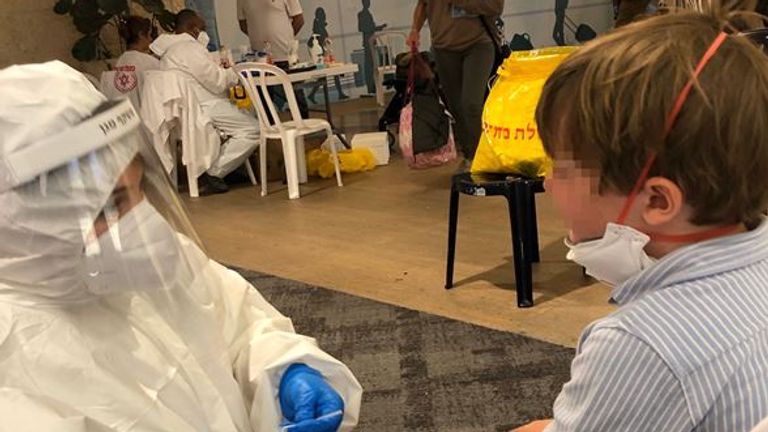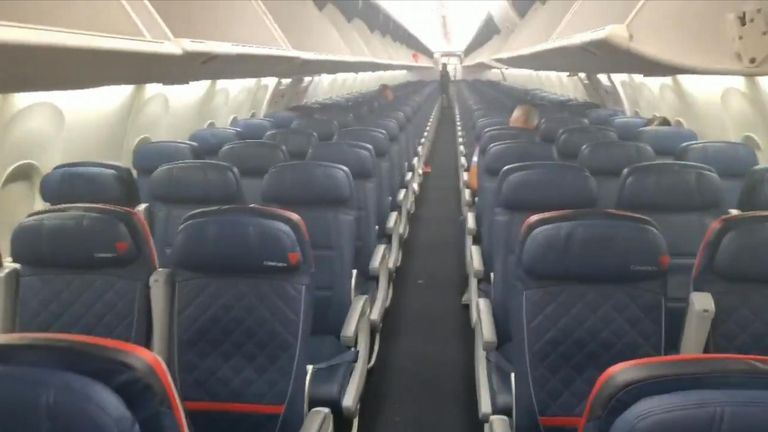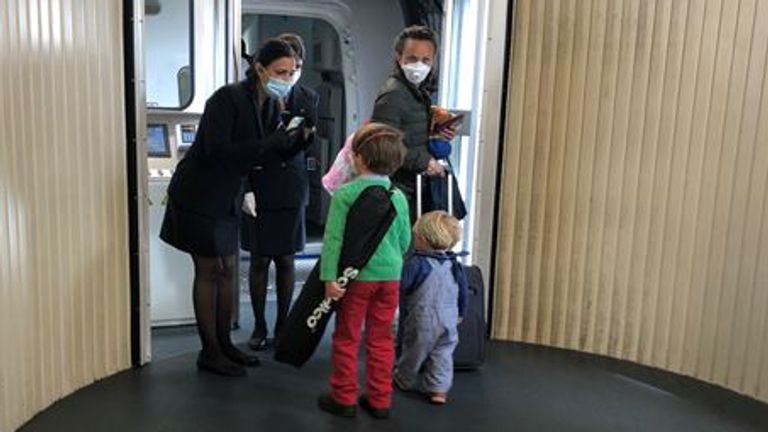The smile: that central component of human interaction – simple, powerful, comforting, rewarding – especially in these challenging 'corona-times'.
But now it's becoming a casualty of coronavirus; hidden, as it so often is, behind the face mask.
How hard it must be for masked medical staff trying to interact emotionally, encouragingly, with their patients?
I suppose it means our eyes have to work a little harder to signal that under the mask there is a smile.
It's a thought that occurs to my wife and me as we walk with our two young sons through an almost deserted Heathrow Airport.
Advertisement
Our masks are donned; we are preparing to leave a country where they are not, yet, de rigueur for another where they are.
In the space of just a few minutes, a number of interactions – with the check-in staff, with a police officer and with my six-year-old – need something more because the smile is hidden behind the mask.
More from Covid-19
We're on a journey back to our home and my base as Sky's Middle East correspondent.
It's the family's first venture out for over a month. Lots has changed, temporarily we all hope, but there is still plenty to think about.

The hidden smile is a little thing. An empty airport is altogether different: an unnervingly eerie sight.
Heathrow's Terminal 4 should host 9.4 million passengers a year. Its departures hall is a third of a mile long.
But today, like so many before and who knows how many to come, it's almost deserted.
The check-in desks are empty; the only sign of life is the screensavers on the monitors.
Above me, the departures board shows just two flights – one to Rome, and the other, ours, to Tel Aviv.
Airside, all the shops are shuttered. Little says 'global economic shutdown' more strikingly than all this. It's shuddering.
We're heading home because the Israeli lockdown, which was imposed earlier than the UK one, is now slowly being reduced. Schools will soon reopen.
We left for the UK in mid-March for a mixture of personal and professional reasons.
Now's the time to head back. We've secured seats on a one-off flight put on by Israel's national carrier El Al to repatriate Israelis and residents with special permission.
In these times of coronavirus, the 'welcome on board' is accompanied now with a temperature check. A pistol-like device is held to each of our foreheads by the cabin crew.

As we find our seats, another corona-moment. The man my wife is due to sit next to isn't wearing a mask. Awkward.
We'd quite like him to, not least because my wife is pregnant and potentially in a higher-risk category.
So, with a smile (that's hidden), I enquire. Will he be wearing it?
"I wasn't planning to," he says. No mask. And no smile.
Awkward indeed, but resolved by a member of the cabin crew who tells him it's mandatory. A new normal.
As we taxi, we pass lines of planes, furloughed like the staff of the airlines they belong to.
There's plenty of debate about how to get them flying again. Leave the middle seat empty?
But it seems to me that the concept of social distancing on a plane is impossible.
Even if you leave the middle seat empty, the people in front of and behind you are still right next to you.
An empty middle seat will drive up prices or send airlines bust. From where I'm sitting, it's not viable.

The inflight meal arrives and makes me think: if every passenger takes their mask off for their meal and drink, what's the point?
My neighbour looks at me as I sip my drink. He's not eating. His mask is still on. I can't read his face but I can imagine it.
On arrival, Israeli order kicks in.
Countries globally have chosen different ways of dealing with the crisis. Israel's response seems to be belt and braces.
The aircraft door swings open to reveal soldiers who use the PA system to explain politely that we'll need to comply withRead More – Source
[contf]
[contfnew]

sky news
[contfnewc]
[contfnewc]





